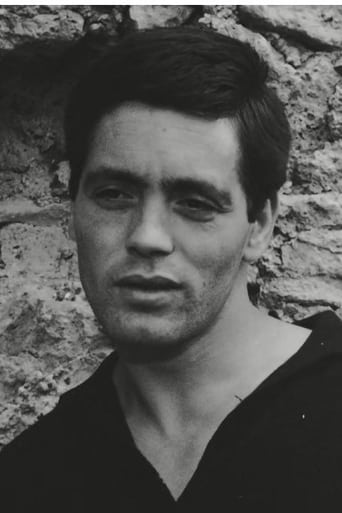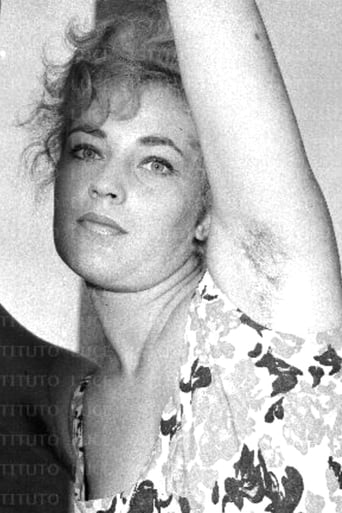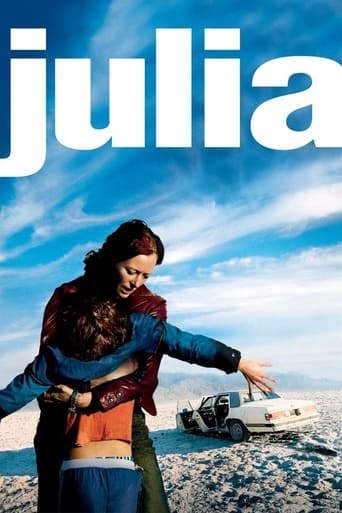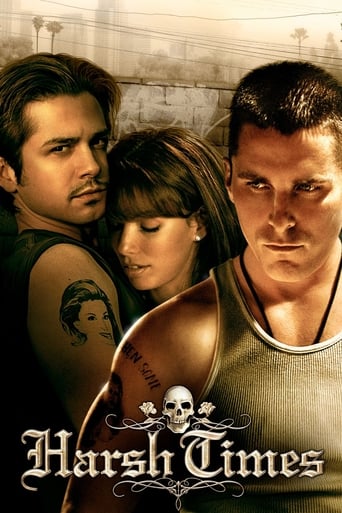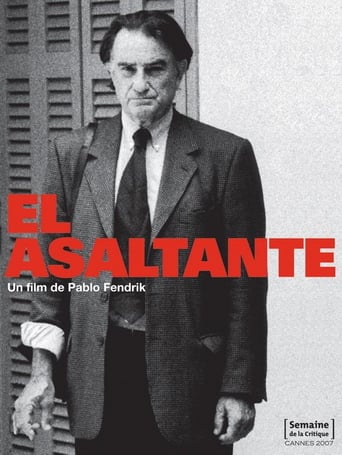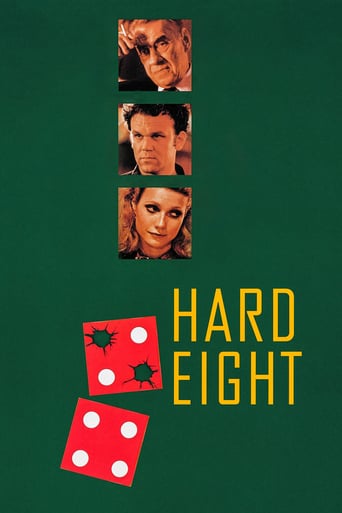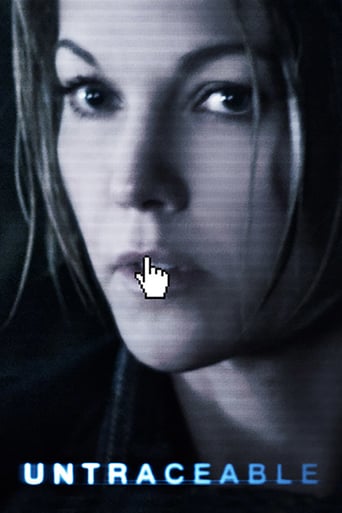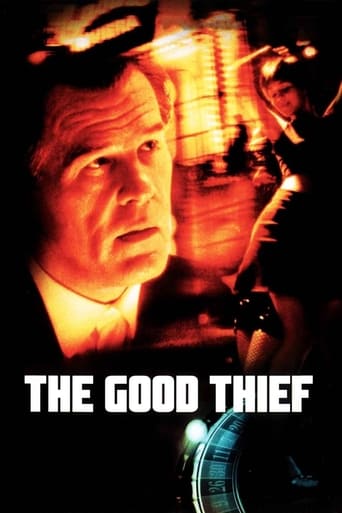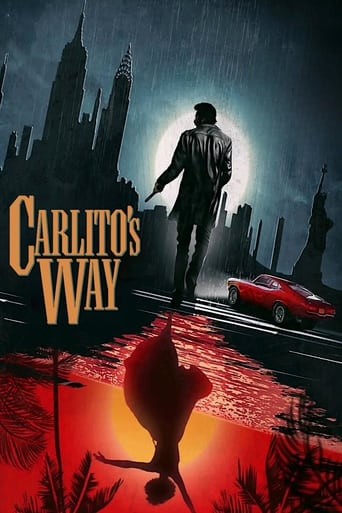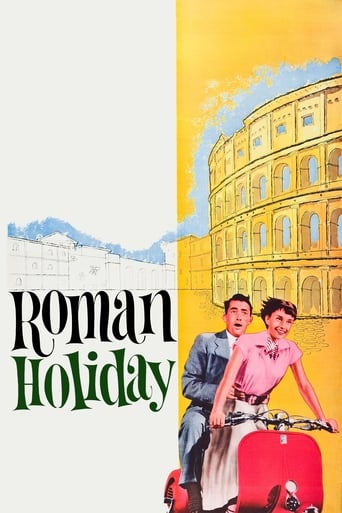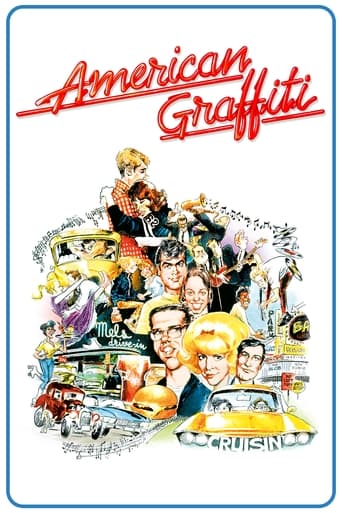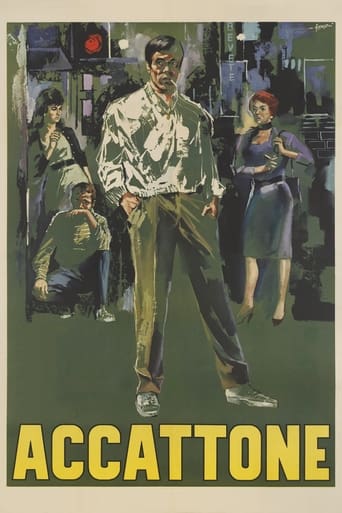
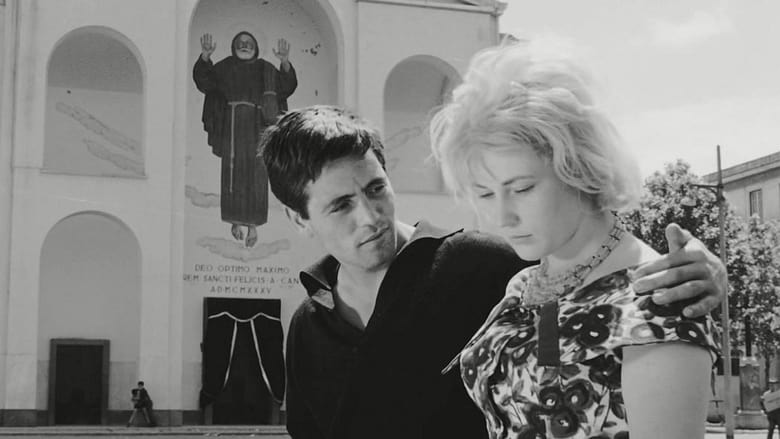
Accattone (1968)
A pimp with no other means to provide for himself finds his life spiralling out of control when his prostitute is sent to prison.
Watch Trailer
Cast


Similar titles
Reviews
As Good As It Gets
It's not great by any means, but it's a pretty good movie that didn't leave me filled with regret for investing time in it.
An old-fashioned movie made with new-fashioned finesse.
The story, direction, characters, and writing/dialogue is akin to taking a tranquilizer shot to the neck, but everything else was so well done.
This is not the Rome you see on Contiki. Pasolini has conjured up the half-life of the streets in this extraordinary movie. Accatone is a pimp and an idler, his friends are no better, and they walk Rome's emptiest streets night and day doing nothing much at all. Pasolini captures their aimless existence with his artless cinematography. Most of the dialogue is shot close up, and the cast deliver their lines with character and simplicity. It is perhaps their authenticity that makes them charming. Even Accatone is charming, despite his selfishness, idleness, resentment and occasional misogyny. They all need to be charming. In the bleak world of this movie, irony is the only defence against madness. There are moments of happiness that break through, and prevent the film from becoming monotonous or unrealistic. The beach scene near the start, and the later conversations between the tough and self-confident prostitutes, are scenes in which irony breaks out into humour, and defiance momentarily turns to content."The world will kill me, or I'll kill it!" exclaims Accatone. He struggles for redemption— but I won't spoil the end of the movie.
Just to start with, Accattone was not filmed in Naples but in Rome. Someone might have brought to that understanding by some Neapolitans gangsters that appear at some point in the movie As for the "ruins" that scatter the landscape, they are mostly buildings that will soon replace the barracks such as the one in which Accattone lives, or the Acquedotto Felice, an ancient Roman aqueduct that runs close to Prenestina and Casilina, two Roman suburbs, that you can see in Mamma Roma as well. Franco Citti, the character of Accattone, perfectly embodies the roman lumpenproletariat of the time: idle, fatalistic and desperate. Pasolini met Franco's brother Sergio, a plasterer, hanging around Cinecittà in 1951. He introduced him to his brother Franco that became Pasolini's dialectical adviser for Accattone, Mamma Roma and his book "Ragazzi di vita"; his "living vocabulary" as he called him. Indeed, Pasolini interests for dialects and slangs (Roman is not really a dialect anymore but a slang) was not disappointed. The dialogues between the characters are full of fantasy: rude and in some way reminiscent of their peasant past. A must see if you're interested in Neorealism and in the "ways of the underworld lumpenproletariat". Someone connected this movie with Bunuel's "Los Olvidados". I definitely agree.
Pasolini's first film "Accatone" is exactly as one would expect a typical Pasolini film to be: wreathed in raw violence, and shot with a brilliant sense of poetic slash brutal realism, reminiscent of the neo-realism era, and perhaps, if not for sure, a semi-autobiographical portrait of life in the streets of Rome's peripheries. "Accatone" is, at its best, a chunk of life, which Pasolini managed to extract not as it initially was, but dramatically filtered through his own personal lyrical gaze. Gangs, prostitutes, lies and deceit lie in this film's core. A sense of irresponsible opportunism is seen in this film, almost no regrets for the past and no fears for the future. In fact, the movie's tragic hero, Vittorio Accatone, is a dark alter-ego of yet another favored Italian movie character, embodied only a year before by Marcello Mastroianni in "La Dolce Vita". Perhaps, in this case, Accatone was not a party animal journalist who sought ephemeral pleasure in social middle-class gatherings and women, but the spirit is, by itself, maintained astonishingly faithfully: Accatone is no longer a protagonist in Pasolini's movie, doomed to descend lower and lower in social class, losing both his dignity, his social acceptability and his profound "style", but a symbol, a metaphor for Pasolini's own political beliefs. Under this figure of a brute, behind the otherwise repelling image of a short dirty man with a sly smile and a peculiar walk, lies the failure of post war Italian government, a government which, according to this movie's subtext, strove so hopelessly to attain social and economical success for Rome's population, and somehow neglected or marginalized Rome's peripheries, causing people like Accatone and his girlfriends to result in prostitution and theft. A kind of pretension and make-belief well being which was also visible, at the time, in America. Yes, Accatone is the result of this American Dream's pastische.
Accatone is an interesting film because Pasolini exposes to his audience a particular lifestyle and social class which would not be accurately touched on in an American picture. If Hollywood had ever discussed Accatone's subject matter they would display it with all its stereotypical adornments and falsities which most US moviegoers are accustomed to. Pasolini is not afraid to present the grittier side of the subproletariat as is epitomized in the film's main character, Accatone, who struggles with his profession of pimping and becoming more sensitive to his women and to the world. Pasolini's debut is delicately permeated with political concepts and allegories, yet we can see that he is experimenting newly with the technique of film and developing a filmic narrative structure; more of his full-fledged sociopolitical allegories would be pursued in films like The Gospel and Hawks and Sparrows. The film stars Franco Citti who at the time of making of the film was a nonprofessional. However his performance is substantial considering him being a novice and having his voice overdubbed by another actor. Citti would soon become a Pasolini regular, starring in Oedipus Rex, Arabian Nights, and other supporting roles. However, as the film progresses the attention is centered on the female lead, who plays the naive soon-to-be callous farm worker who is duped by Accatone into prostitution. Before Pasolini ventured into the cinema he had a knack for writing. In his first two novels Pasolini had utilized the language of his mother's homeland, Friuli, for colloquial discourse amongst his characters who lived in subproletariat communities. It is not surprising that the subject of these novels would be the focal point of Accatone. In addition I believe Pasolini had rendered his ideas (from his literature) appropriately for his film, yet not becoming to carried away with fidelity and technical aspects which are profuse in films today. To this day there are apparently no film directors as consciously aware of his country and government as Pasolini was and that would transcend these beliefs into his art with controversy yet at the same time subtlety.


